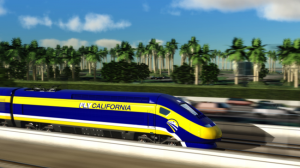From the Wall Street Journal Political Diary E-mail… (Congrats to FR blogger Adam Probolsky for his firm’s mention)
Bullet Train Boondoggle
Florida, Ohio and Wisconsin turned down plans to build high-speed rail lines in their cash-strapped states for fear of cost over-runs and delays. But an updated business plan from the California High-Speed Rail Authority shows that those fears are turning into reality for the Golden State — which has made the development of bullet trains a priority.
A new business plan released last week estimated that the cost of the San Francisco-to-Los Angeles high-speed line will reach $98.5 billion dollars. That’s three times more than the $33 billion projected when California voters approved $9 billion in bond funding in 2008, and twice as expensive as was estimated just two years ago. The line was also supposed to be completed by 2020. But the new plan estimates that it won’t be fully operational until more than a decade later in 2033. Construction hasn’t even begun yet.
 The state high-speed rail agency has requested $6 billion to begin construction on the first 140-mile section of the track from Bakersfield to just south of Merced. Currently the state has roughly $3 billion from the federal government, $3 billion from stimulus money and the $9 billion in bond funding approved by voters. That’s enough to build the first section of the line, but far more private investment is needed if the full San Francisco-to-Los Angeles goal is to be realized. And with ridership figures in question and cost estimates constantly being revised, attracting private capital may prove difficult.
The state high-speed rail agency has requested $6 billion to begin construction on the first 140-mile section of the track from Bakersfield to just south of Merced. Currently the state has roughly $3 billion from the federal government, $3 billion from stimulus money and the $9 billion in bond funding approved by voters. That’s enough to build the first section of the line, but far more private investment is needed if the full San Francisco-to-Los Angeles goal is to be realized. And with ridership figures in question and cost estimates constantly being revised, attracting private capital may prove difficult.
This doesn’t seem to bother Democratic Gov. Jerry Brown, who issued a statement of support after the new plan was announced. “The High-Speed Rail Authority’s business plan is solid and lays the foundation for a 21st century transportation system,” said the governor.
But Californians aren’t in agreement. A poll taken by Probolsky Research LLC before the revised cost estimate found that 62.4% of voters wanted the high-speed rail project stopped. Only 31.1% wanted to keep it. Chances are, support for the venture hasn’t gone up since the $98.5 billion price tag was announced.
— Matthew Payne

